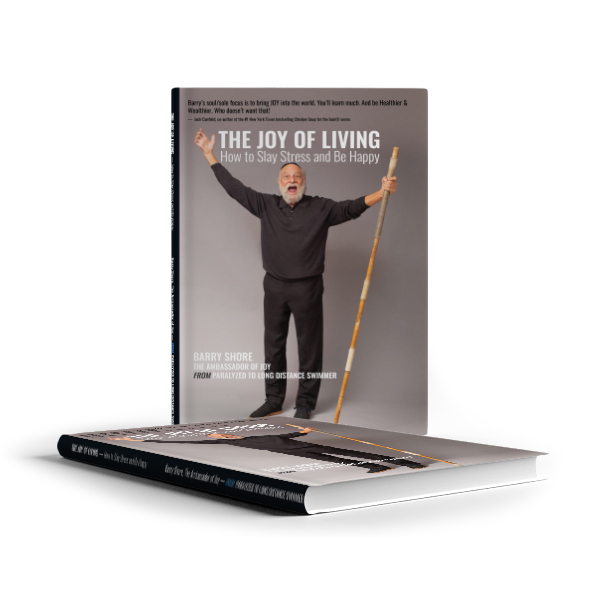Share This Episode

Building Conscious Wealth: Purpose, Growth, and Impact with Brandon Hatton
The Joy of Living Podcast with Barry Shore
In this inspiring episode of The Joy of Living Podcast, host Barry Shore is joined by Brandon Hatton to discuss the power of conscious capitalism, lifelong learning, and the true meaning of wealth. Brandon shares his insights on how wealth goes beyond money and is deeply tied to purpose, connection, and personal growth. They dive into the importance of developing a holistic perspective on wealth and the impact it has on both individuals and society. Together, they explore how businesses can be forces for good and how fostering a love for learning from an early age shapes the leaders of tomorrow. Tune in for a thought-provoking conversation that will leave you energized, inspired, and ready to make a difference in the world.
Listen Here (click here to watch episode)
Sponsors:
Water, wonderful, clean, delightfully tasting water. So good because it keeps you healthy and your family and your friends and your pets. I use an AquaTru water filter. AquaTru water filter is a four-stage reverse osmosis purification process. And the best thing I love about it is no installation or plumbing. I got it. I sent it to my home and I was able to set it up so easily and it works and it removes 15 times more contaminants than any regular filter they ever had. And the great news is the filters are affordable and long lasting. You don’t change in every two or three months. They’ll last from six months, maybe even two years. And the result of that is that one set of filters will give you over 4,000 bottles of water. That’s less than three cents a bottle. Today, my listeners, to the joy of living, you’re gonna receive 20 % off. That’s right, 20 % off any Aqua True Purifier. Enter the code JOY at checkout. Go to AquaTru.com
Show Notes:
[10.01] Wealth is More Than Just Money
- Wealth is often thought of as money, but it encompasses far more than just financial standing.
- Money is a part of wealth, but without the other pillars like health, family, and purpose, it can be detrimental.
- Conversations about wealth should go beyond just money and address deeper issues, like family legacy and purpose.
- Generational wealth is a critical issue, with $90 trillion expected to be passed down to future generations. Without proper conversations, this could cause fear and scarcity.
- Work is an essential part of life, even for the wealthy. It keeps the mind, body, and soul engaged.
- Creating a sense of independence based solely on money can be harmful. True independence comes from personal growth, not just financial resources.
- Money should serve as a tool, not a master. The true gift is teaching the next generation how to use wealth responsibly.
- Wealth conversations should involve personal responsibility, family values, and a mindset that aligns with health and connection, not just accumulation.
[19.02] Navigating the Complexities of Wealth and Generational Responsibility
- The modern world connects us globally, but many still feel isolated in their desire to make a positive impact.
- Younger generations are eager to leverage wealth for the greater good, balancing personal success with societal contributions.
- Parents often struggle between sharing everything or nothing about their finances with their children.
- The fear of spoiling children with wealth can be addressed by redefining what “spoiled” really means.
- Open conversations about wealth can help prevent harmful myths and foster responsibility in the next generation.
- The vast wealth transfer across generations offers an opportunity for societal improvement, but it must be handled carefully.
- Wealth will likely concentrate among fewer people, making it crucial to teach future generations about work and accountability.
- Khalil Gibran’s perspective reminds us that children are not our possessions, but individuals who must learn to live independently.
[26.00] The Power of Conscious Capitalism and Purpose-Driven Business
- The world is on the cusp of a significant leap in understanding relationships and connections with others.
- Conversations about wealth often start with money but shift towards deeper values like connection and purpose.
- Conscious capitalism aligns business practices with a sense of purpose, creating opportunities for both personal and societal growth.
- Small and mid-sized businesses are ideal for conscious capitalism, as they allow for genuine community and connection.
- By focusing on employees’ personal growth and aligning them with company purpose, businesses can thrive while fostering responsibility.
- Conscious capitalism extends to all stakeholders, ensuring that clients, service providers, and employees are treated with respect and care.
- Work is inevitable, but conscious capitalism encourages creating businesses that foster purpose, care, and a sense of fulfillment.
- True business success lies in benefiting everyone involved, reflecting the philosophy that “the U comes before the I,” where serving others leads to personal success.
[39.01] The Journey of Joy and Purpose
- In a stressful business environment, knowing you’re doing good brings joy and makes the journey meaningful.
- The acronym for joy is “Journey of You,” emphasizing personal development and purpose in life.
- Life will always have challenges, but with a purpose-driven mindset, even the toughest times feel less burdensome.
- Understanding that the journey is about self-growth helps overcome obstacles and fosters excitement for what’s ahead.
- Engaging in fun, meaningful activities, like a card game on wealth conversations, can open eyes to deeper discussions.
- Childhood money memories often shape our perceptions of wealth, and understanding them can shift our financial perspectives.
- Conversations about money and inheritance should be open and honest, promoting healthier relationships with wealth.
- True wealth isn’t just financial; it’s about creating a community and a space where everyone thrives together.
[50.41] The Power of Joy, Wealth, and Lifelong Learning
- Living a purposeful life filled with joy makes even the toughest times more manageable.
- Embracing a higher purpose in life turns obstacles into opportunities for personal growth.
- A positive mindset centered on love, life, hope, and play can lead to greater success and fulfillment.
- Engaging in playful activities, like card games, can open up important conversations about wealth and personal values.
- Early childhood education plays a crucial role in shaping a child’s character, happiness, and success in life.
- Lifelong learning is key to personal development, and it’s vital to instill this mindset early on.
- Building a supportive community through education and family helps ensure that every child thrives.
Insider Tips:
Nicole Iny is the Executive Director of Grants and Consumer Education at FAIR Health, a national, independent nonprofit organization that qualifies as a public charity under section 501(c)(3) of the federal tax code. FAIR Health possesses the nation’s largest collection of private healthcare claims data, which includes over 47 billion claim records. It is dedicated to bringing transparency and integrity to healthcare costs and health insurance information through data products, consumer resources and health systems research support.
Topics:
- What is FAIR Health?
- What types of tools and resources are offered on FAIRHealthOlderAdults.org?
- What obstacles do older adults and family caregivers face when navigating the healthcare system, and what strategies can they use to find the services and support they need?
- Have you received any feedback from patients and/or their caregivers about the shared decision-making resources available on the FAIR Health consumer website?
- Where can patients, family caregivers and healthcare providers find more information?
Important Links:
About Brandon Hatton
Brandon has made a lot of money, found out it wasn’t enough, now teaches entrepreneurs, founders and families how to transform their money into a purposeful and fulfilling life. Brandon Hatton began his career in the financial services industry working tirelessly at Merrill Lynch. His business proposition — and that of the industry overall — was simple: if clients gave him money; his goal was to make them more money. In this mission, he came across many people with seemingly unlimited financial means who were living unfulfilled lives. Despite their financial success, they were stuck chasing more in a vicious cycle of fear and insecurity.

